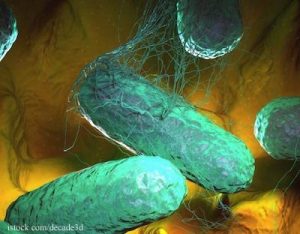The Indiana Department of Health announced that a food handler at Purdue University has tested positive for Salmonella Typhi, the bacteria that causes typhoid fever. Public health officials and University staff are working to investigate the case.
 Anyone who ate at the Boiler Bistro, John Purdue Room, or Lavazza at Marriott Hall on the Purdue campus from January 23 to January 25, 2013, may be at risk for the infection. If you ate at those places on those dates and become sick, see a doctor immediately. Symptoms of the illness include high fever up to 104 degrees F, weakness, headache, stomach pains, nausea, vomiting, diarrhea, and loss of appetite. Some individuals develop a rash of flat, rose-colored spots. Symptoms usually begin 8 to 14 days after exposure, but some people don’t become sick until a month has elapsed.
Anyone who ate at the Boiler Bistro, John Purdue Room, or Lavazza at Marriott Hall on the Purdue campus from January 23 to January 25, 2013, may be at risk for the infection. If you ate at those places on those dates and become sick, see a doctor immediately. Symptoms of the illness include high fever up to 104 degrees F, weakness, headache, stomach pains, nausea, vomiting, diarrhea, and loss of appetite. Some individuals develop a rash of flat, rose-colored spots. Symptoms usually begin 8 to 14 days after exposure, but some people don’t become sick until a month has elapsed.
State Health Commissioner Dr. William VanNess II said, “unfortunately, symptoms of typhoid fever can resemble other illnesses, so for those individuals who may have been exposed, it’s critical to see a healthcare provider right away if you begin to experience symptoms. Be sure to tell your physician that you may have been exposed to typhoid fever.”
A blood test is necessary to diagnose the disease. Salmonella Typhi is spread through person to person contact and through contaminated food and water. The illness can be life-threatening, and remains contagious even after the person gets better. Typhoid fever can be successfully treated with antibiotics. If left untreated, typhoid fever can be fatal.




